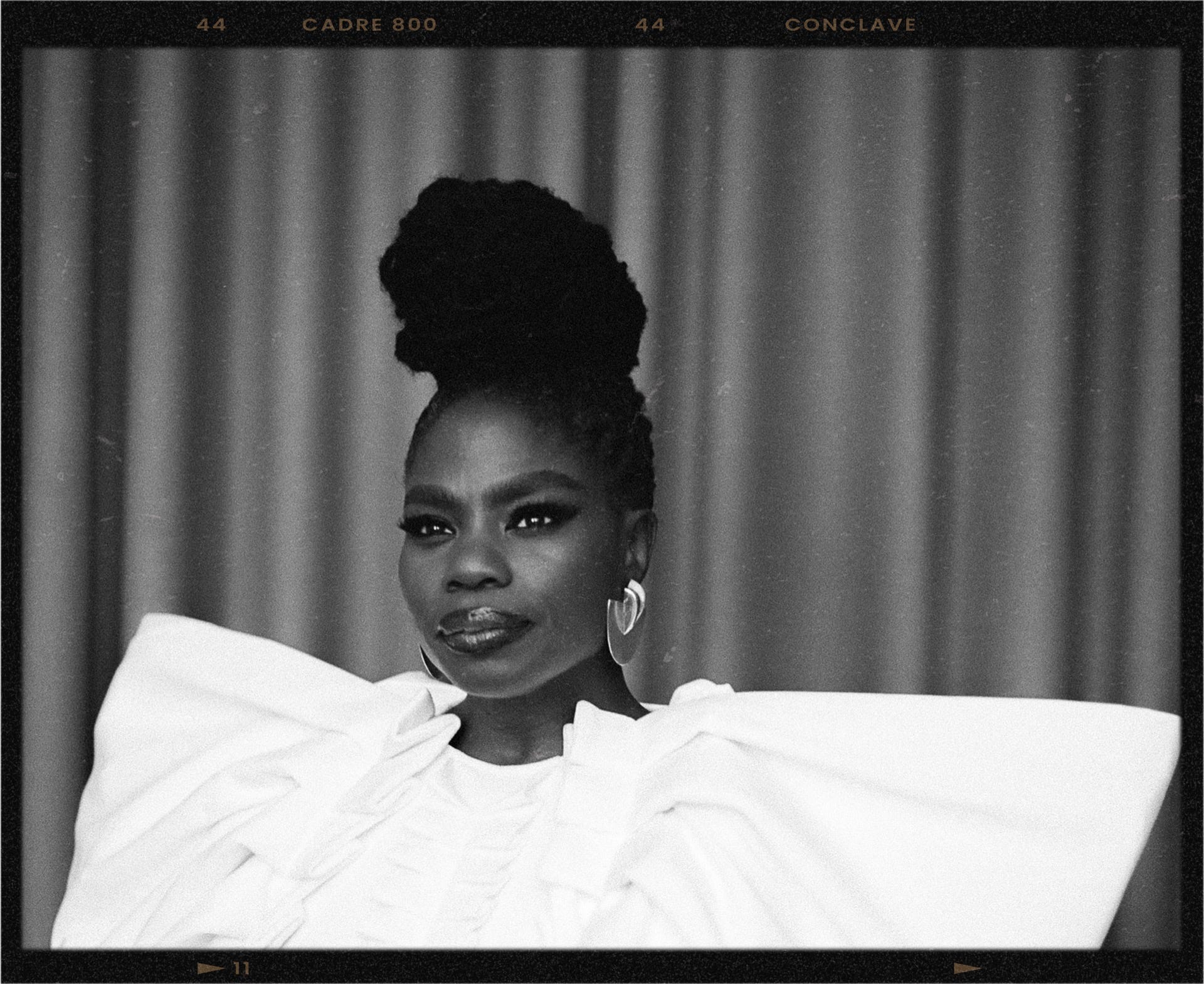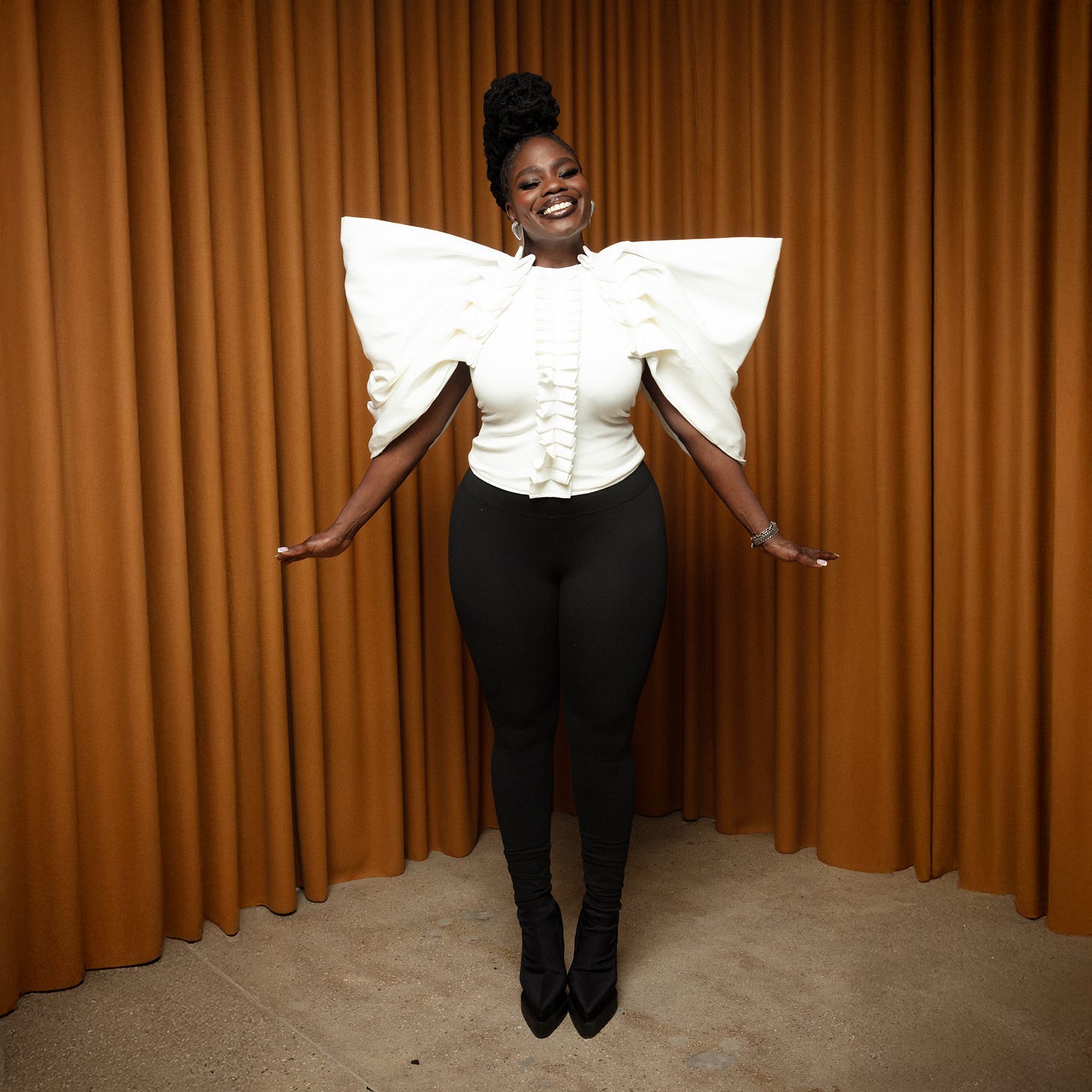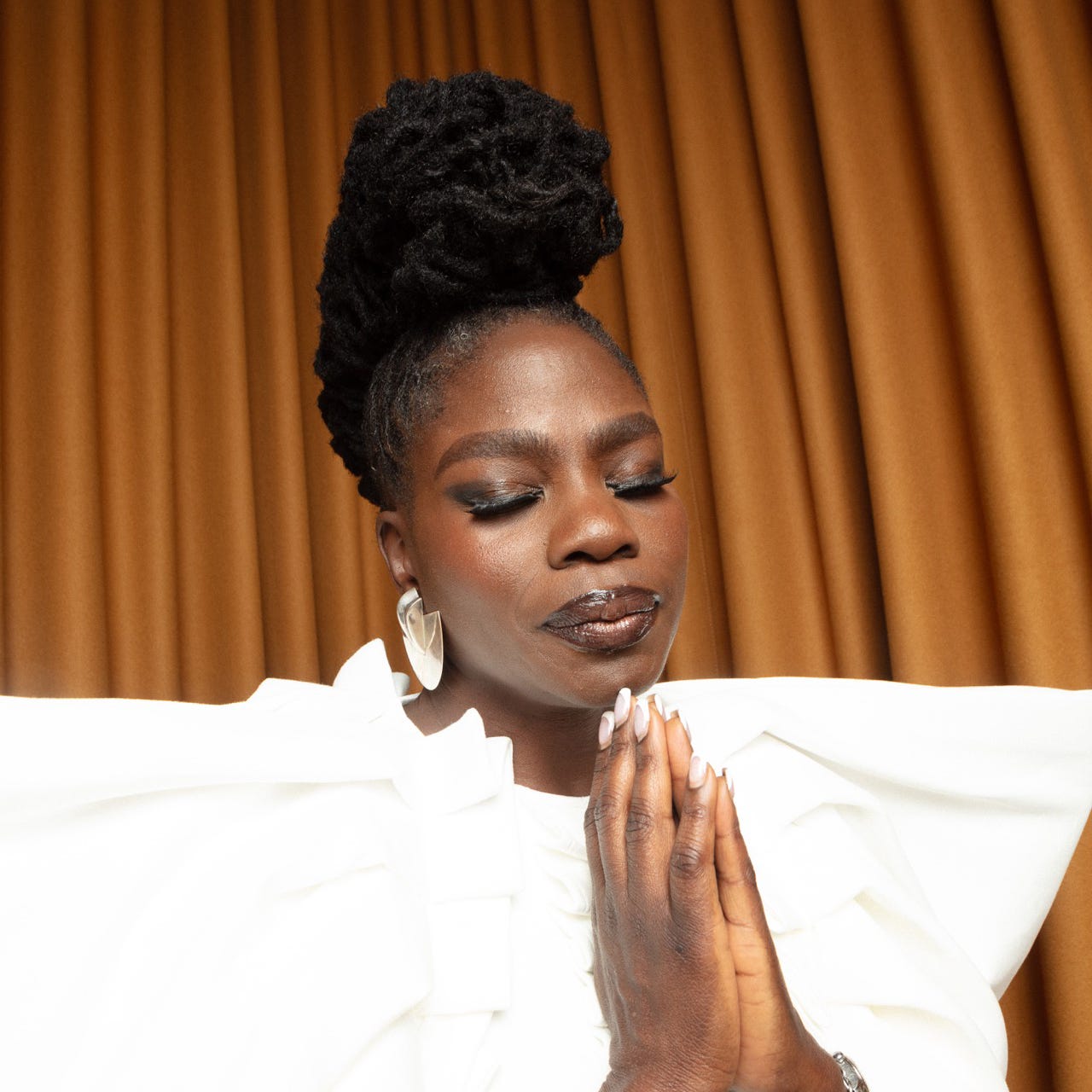
After a major career pivot in her thirties, the fifty-two-year-old mother, makeup artist, educator and CEO is creating her legacy in the beauty industry. We talked to the multi-hyphenate about life-changing milestones, business during a global pandemic, and what it means to be a Black woman in beauty.
Danessa Myricks and I met on Zoom five days after her return from the Dominican Republic, where she had whisked away her beauty team as an end-of-year thank-you for their hard work. It was also four days before she left for South Africa to “regroup, restore, center, and remember.” It’s the third week in December — a time when people push unfinished business to after the new year. Yet, the self-taught makeup artist and educator extraordinaire, whose namesake label is now sold in Sephora, still makes time to answer questions about her journey — from industry secret weapon to mainstream cult favorite. Her impressive capacity, much more than the typically busy boss penciling in the press between work and travel, speaks to who she is as a person and the brand she’s built.
The sun has decided to join us, beaming through the window and onto the right side of Danessa’s face. Even that feels divine and symbolic, as her energy really is like a bright light. We immediately launch into that familiar, endearing exchange of compliments and gassing-up between Black women. “I love your hair, I’m gonna die!” Danessa exclaims about my two coily Afro puffs. “Thank you so much, and you look AMAZING!” I reply. A longtime fan of Danessa’s artistry and her ever-growing cosmetic empire, I scream internally and then ask her to take me back to the beginning.
Danessa grew up in Queens Village, New York, but was bussed to school in a different district. Her mother, an advocate for learning, wanted her children to receive the best education possible. As if having acne during the vulnerable, confusing years of teenhood wasn’t enough, Danessa was often the only Black kid at school, “which led to lots of bullying,” she tells me. “Just for the difference in the color of my skin, the texture of my hair, the clothes I wore, the music I listened to, and the list goes on. I was called ugly often.” Danessa had nine brothers and sisters, and her parents worked tirelessly to provide for them. “We were latchkey kids,” she says. “My parents were both victims of corporate downsizing, layoffs, etcetera.” Eventually, her parents started a cleaning company that serviced homes and small businesses. “This was how they funded our hopes and dreams for a better future. I learned from them the idea of consistent hard work, entrepreneurship, and the belief that starting over and reimagining your professional life is a part of life,” the artist says as she acknowledges her parents’ role in her own trajectory.
Unaware then, so much of Danessa’s early life was a foreshadowing of, and preparation for, her present success.

What are your earliest makeup memories?
It's funny because my earliest memory of makeup would be watching my mom. She was a huge fan of red and rosy cheeks and face powder. My earliest memories are of her with her compacts that smelled like baby powder and her putting on that red lip. I'm a huge fan of my mother; she's the most beautiful person in the world.
My second memory is of her trying to help me because I had terrible acne. Her solution for me, since I couldn't find foundation shades, was to wear blue eyeliner. To this day, blue eyeliner is my go-to. She was like, you have brown eyes, all you need is some bright blue eyeliner and you’ll look amazing.
I love that.
When I was growing up in a small town like Augusta, Black girls, especially dark-skinned Black girls, were not encouraged to wear bright makeup. I was really fortunate to be born into a family that celebrated me and my complexion.
When did you realize that makeup is what you wanted to do?
I always call myself an accidental makeup artist because I never had an intention. I was always obsessed with art — sketching and coloring and all of that growing up, water painting. But I never considered myself an artist. It was just something that always inspired me.
One of my corporate jobs was working at a company that published hair and beauty magazines. That's where I got introduced to the idea of what a makeup artist was. I was heading up marketing and sales, so I put together photoshoots for the magazine. That's where the love really began; just the transformation they were able to create and how it made people feel, really excited me. But then the owner decided that after years of working there, he was gonna close the business.
I'm a single mom of two kids. But I wasn't necessarily doing something I was passionate about. I still had that creative fire in my belly, you know? So I was just like, okay, you can either get another job and sell your soul every day, or this is an opportunity for you to be happy doing something that you enjoy.
I want freedom. I wanna have control over my destiny.
How old were you then?
I was thirty.
It’s never too late. And you were very much a beauty professional and enthusiast. And then you went viral on TikTok. It just makes sense because, as beauty editors, we saw you and knew it was coming.
I've been doing this for a really long time and there have been no big, giant moments for me in my ascension. It's been slow and steady, just consistency. I've always worked to create something that's new and different and special. And I've been in love with everything that I've created.
What was it like being embraced by the public in that way?
So many new people were introduced to our brand [through TikTok], but they saw me as a color brand [that makes] glitters and things. They didn't know the history of my aesthetic. I've always been an architect of skin, making the skin look really beautiful and glowy. I want everybody to just fall in love with how their skin looks.
One of the big things that I've always wanted to do is unify and create community through makeup. I wanted to remember and prioritize people who are always forgotten. I also wanna create a space where no one is excluded. I'm making this for everyone.
That intention certainly shows up. There is a warm response to your brand from everyone.
It's not just makeup artists, which has been my history in the brand, artists loving these artist-created products, but it's everyone. I'm getting chills right now because it’s the first time for me. Complexion-wise, everyone feels like they can consume, whether [they’re] eighty or eighteen. Whether you are super fair and live in Scandinavia or you're in Nigeria, you're like, this works perfectly for me, for this environment and my skin tone.
As a creator, as an artist, whether you're a painter, you write a song or whatever, you know in your heart how you feel about it and how you want the world to feel about it. And when it's received that way there are no words to put behind it.
When did you launch Danessa Myricks Beauty?
A year or two after I started doing makeup, I started making makeup. But the official launch date [of DMB] was in 2015. I literally had been making makeup in my basement since I started doing makeup and selling it at shows.
I learned how to make products that can be sold all over the world and how to source products. I learned how to do shading for the world. I learned about the chemistry of a product on the job working for other brands.
I realized that I have a voice, and there are things that I wanted to say as an artist and as a creator that I can't say through the lens of another brand. I need to not be afraid, not hide behind someone else and just do what I know is necessary.
Can you talk more about what you’re saying with DMB? What feels necessary?
I know people feel like there's a lot of change [in the industry] because brands are making more shades, which is great, and I definitely applaud them. But it's the quality of the shades that they're creating, it's still not right.
Just because you add black or red and make something darker doesn't mean that it’s working. There are so many conversations that are outside of complexion and race.
Like the rule that this can only be used here, and this is an eyeliner, this is lipstick. They're making people buy ten things and it's not even necessary. As a makeup artist, you know how flexible products can be and how you can layer and mix, and how one thing can do a million things.
Your products certainly create space for play. Can you share a bit more about your business journey? We hear these stories about the difficulty Black entrepreneurs face in raising capital. How was your own funding journey?
It was all self-funded. I literally would do a job and put it in the bank and turn it around to buy a product or to pay a chemist. I kinda had to pimp myself out as an artist and as a consultant to generate the money. We've been self-funded from the beginning. I always say that this is the brand that the community built because I have people who've supported me from day one. It's been very organic, very grassroots.
Do you have any pivotal moments that stand out in your career?
I would say my artist community has been a big part of it. There are so many artists who get to touch magical people on the planet, that hot celebrity or that actress, who are in spaces that I'm not because that's not my journey. They've been incredibly supportive, like talking about the things that they use from my brand that they love.
And what are some of the challenges that you faced before getting where you are now?
Any entrepreneur would agree that every day is a challenge. Finding people who want to play in your sandbox and ride for you is a challenge. Financing your dream and finding people who wanna be a part of it is a big one.
There have been so many times when we were almost out of business. The most recent and vivid was during the pandemic. A lot of people don't know I ran the company from my house from the very beginning and moved into an office in March 2020.
My entire house was a warehouse. I literally lived off of a bed and a refrigerator, and everything was happening in my house. We moved into an office on March 13th or something like that and on March 20th, the city closed.
We finally have offices, there’s finally a warehouse and no staff could come to work. We had no staff in the warehouse. There's nobody shopping, we can't do shows. It was like, how are we gonna earn money?
It was like, okay, I came this far, and now it's all gonna fall apart.
Incredible. What got you through that?
In those moments when things are falling apart, my first thing is always, how can I be of service? Because I know I'm here as a result of people who are cheering for me.
We offered lots of free education and free webinars. I did a free webinar about keeping your kit healthy and just tried to get the fear out of all the makeup artists who weren’t working at that time.
I also offered an opportunity for artists to rebuild their kits. Because we didn't know what COVID was. So I was like, what if I give people the opportunity to throw everything out that they have and start fresh? We basically were giving products away so people were able to rebuild their kit with the products they used from us below cost.
What does it mean for you, specifically, being a Black woman in the beauty industry?
I've learned that my presence is important to a lot of people. I see the value of being here and staying here. I go to an event and somebody walks up to me and tells me their story or says, Hey, I bought this and I'm letting you know that I bought it because I want you to understand what you represent to me.
I was one of those people who didn't think that certain things were possible for me for a lot of different reasons. People needed to see me starting a career at thirty. People need to see an indie brand able to survive in a place like Sephora. People need to see that they can learn something on the job. And you can be a single mom, and still manage to put your kids through college, and maintain a business, and set them up for success — and the generations to come.




